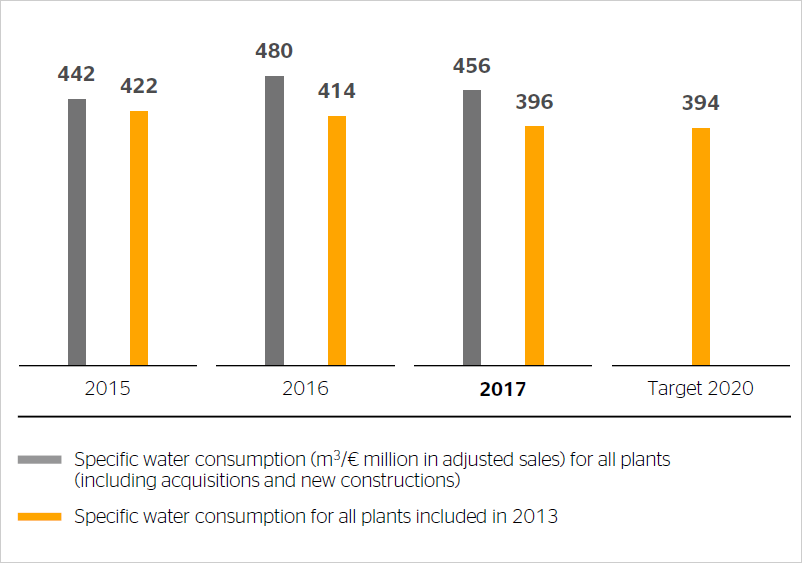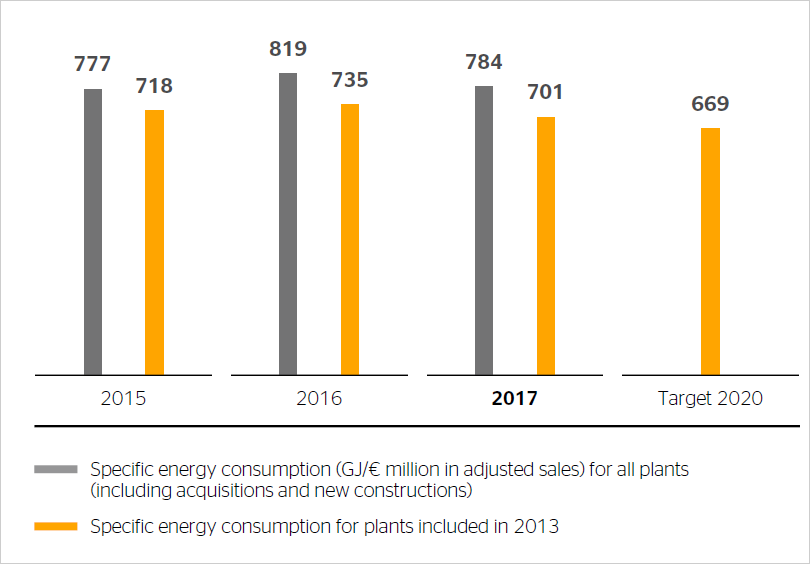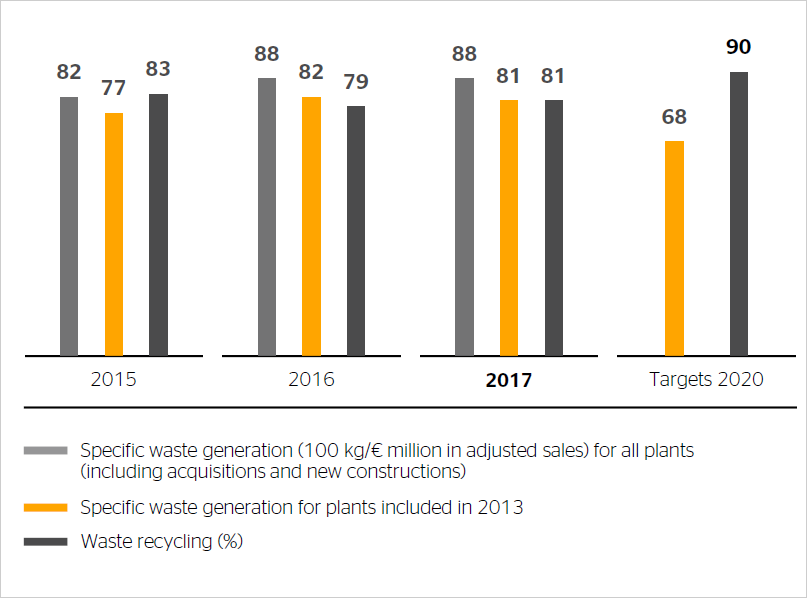About 25 years ago, Continental introduced a corporate-wide environmental management system and extended the corporate strategy to include ecological targets and measures. In the early years, the focus lay on conserving finite resources together with reducing harmful emissions and the company’s environmental footprint. Today, the scope of our environmental management system goes far beyond these objectives. Sustainable management at all stages of the value chain and throughout the entire life cycles of our products is now an integral part of our philosophy. We are gradually fulfilling this responsibility more widely in the supply chain in order to further anchor our strategic alignment as a sustainable company.
The environmental strategy for 2020 makes up the framework of our environmental management policy and outlines a number of clear objectives, indicators and measures. We are working on updating our environmental strategy for the time up to 2030, aligning ourselves with the United Nations’ 17 sustainable development goals (SDG).
Environmental strategy pays off ecologically and economically
By committing ourselves to extensive sustainability goals, we are not only acting responsibly toward the environment and society – we are also thinking and acting in a forward-looking manner and in the interests of creating value for our company. We see the challenges that lie ahead – such as climate change, globalization and urbanization – as opportunities. These opportunities not only require our innovative prowess and the development of innovative technologies and more efficient products, they also boost our competitiveness.
In the reporting year, Continental generated around 40% of consolidated sales through products that are exceptionally energy efficient and/or reduce CO2 emissions. Our environmental strategy and the achievement of our environmental targets pay off ecologically and economically.
Clear targets for improvement
We have set ourselves clear targets. By 2020, we want to reduce our CO2 emissions, energy and water consumption, and waste generation by 20% – in relation to adjusted sales, using 2013 as a basis. We also intend to improve our waste recycling and reuse rate by two percentage points a year. We are on track to achieve our targets. With regard to energy consumption, CO2 emissions and water consumption, we already achieved a reduction of roughly 13% to 15% three years before the end of the timeframe at the locations where we launched the environmental strategy programs in 2013. However, it is also apparent that the consolidated key figures for the environment have not developed in the desired direction due to the many acquisitions in recent years. The number of sites that must be included in reporting has increased from 191 in 2013 to 245 in 2017. Further measures must be implemented at our new locations so that we can contribute to the achievement of the environmental targets there, too. In waste generation and recycling, it also appears that the achievement of the targets will require further initiatives besides the programs to reduce waste and increase the recycling rate already begun.
Certification to environmental standard ISO 14001 is to be compulsory for our strategic suppliers as well. Under these circumstances, we have defined an extensive catalog of individual measures that all serve the same goal of continuously improving our environmental performance.
As in previous years, all environmental performance figures were audited as part of an independent limited assurance audit by auditing firm KPMG AG Wirtschaftsprüfungsgesellschaft.
Around 41% of the world’s population is currently living in regions that experience (in some cases extreme) water shortages, while 800 million people have no access to clean drinking water. In many countries, untreated wastewater is still finding its way into the water cycle. These and other problems will continue to intensify as a result of climate change, and at the latest then, there will be an economic impact – even for local companies. To prepare ourselves to tackle future risks, while at the same time making a contribution to sustainable development, we have placed the issue of water higher on our environmental strategy agenda. In the reporting year, we launched a program that includes a detailed water risk analysis as well as the evaluation of our own locations together with the assessment of the supply chain and its effects on water consumption. Measures derived from this are planned for 2018.
Successful project for sustainability in the supply chain
Sustainable and resource-efficient management is a key component of our environmental strategy. This also applies to our supply chain. A project begun in 2015 to improve the environmental performance of our suppliers in the Mexican states of Jalisco and Guanajuato was successfully completed in the reporting year. The aim of the initiative was to train and help the suppliers to establish and enhance their own environmental and energy management systems. The suppliers that received training as part of the project have achieved excellent success together with the Continental locations in Mexico and made a positive contribution to environmental protection. In total, approximately:
- 775 tons of CO2 emissions
- 923 megawatt hours of energy
- 210 tons of waste
- 4,600 cubic meters of water
were saved in the two-year project. Due to the successful implementation of the measures and the good networking between the suppliers, we have decided to continue this project and to open it up to additional suppliers.
Further information is available from the website set up for the project: www.sustainabilitynetwork.net.
Reduction of plastic waste
Plastic waste is becoming an increasingly serious global environmental problem. To raise awareness of this issue among all employees and decision makers, the Executive Board has initiated a project to significantly reduce plastic waste at Continental. There are three strands to this initiative:
- Banning plastic tableware and cutlery from our cafeterias worldwide.
- Improving waste management and rates of plastic-waste recycling.
- Reducing packaging waste and significantly increasing the amount of reusable packaging in the logistics and purchasing process.
These measures are being tested and analyzed at 10 selected pilot locations. All best-practice measures will then be incrementally rolled out worldwide.










